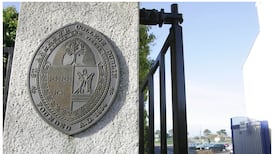After the victory of Mr Gerhard Schroder, the comment most heard on French radio and television was that a new generation with no memory of the second World War has come to power in Germany. But if the French are pleased that Germany is at last shedding its guilt over the Holocaust and the war, they also see Mr Schroder as someone less likely to compromise in Europe.
Germany will be resolutely European, the new Chancellor told the French radio station Europe 1 yesterday morning. "But it's understood that I will also represent German interests within Europe. Not in contradiction, but let us say in friendly competition.""
The psychological shift in Germany will have political consequences, Charles Lambroschini of Le Figaro warned. "Where this new Germany and this new man are concerned, Germany no longer has any complexes," he said. "In the past, we used to say Germany was an economic giant and a political dwarf - no longer. Germany now dares defend its national interests, and we realise that the period is over when Paris set the political tone in Europe and Germany was happy to follow."
The French Prime Minister, Mr Lionel Jospin, said Mr Schroder's election victory showed the "deep desire among German citizens to build a society which cares more about employment and social justice." Mr Jospin was elected on such a platform 16 months ago.
President Jacques Chirac and Mr Jospin immediately invited the new Chancellor to Paris. Mr Schroder showed the importance he sets by relations with France by accepting, and announcing he will lunch with Mr Chirac tomorrow and dine with Mr Jospin. Franco-German relations are so crucial that neither Mr Jospin nor Mr Chirac risked taking a partisan stance during the election campaign. "We will have good relations with the German chancellor, whoever he may be," Mr Jospin said in July.
At the French Ambassadors' Conference last month, both Mr Chirac and the Socialist Foreign Minister, Mr Hubert Vedrine, spoke of the need for renewal in Franco-German relations. Chancellor Kohl never established the kind of rapport with Mr Chirac that he had with the late President Mitterrand; also, French foreign ministers found Mr Klaus Kinkel, their German counterpart under Dr Kohl, prickly.
Mr Jospin spoke hopefully yesterday of "this opportunity to give new energy to our co-operation with Germany, to renew a certain number of bilateral institutions that have become routine".
There is a tinge of concern in France that Mr Schroder is less of a euro-enthusiast than Dr Kohl.
"There was a discussion about whether it was premature to introduce the euro," Mr Schroder said in his Europe 1 interview. "That is past. In any case, the euro is here and we have to make a success of it because the problems would be catastrophic if we didn't."
Mr Schroder is seen as representing a new Germany that is northern, Protestant and attracted by Britain. French media referred to him as "the German Blair" during the campaign, and the French left has misgivings about the depth of his socialist convictions.
"The new Chancellor talks about a Franco-German axis enlarged to include Great Britain," Le Monde fretted. "The fear of a Germany that turns towards London is that of a Germany which turns its back on the Franco-German plan for Europe, materialised in the euro, to give way to a free-trade constellation based on a triple Washington-London-Berlin alliance."





